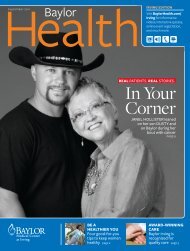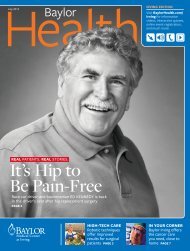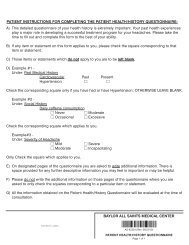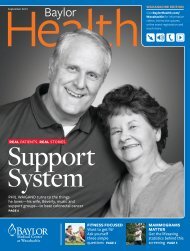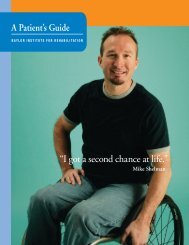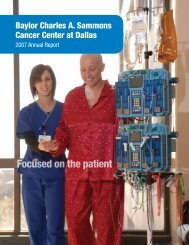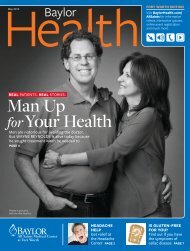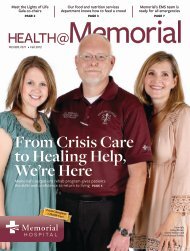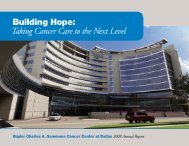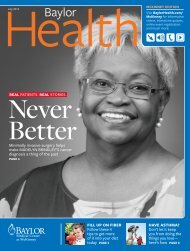Plano - Baylor Health Care System Online Newsroom
Plano - Baylor Health Care System Online Newsroom
Plano - Baylor Health Care System Online Newsroom
You also want an ePaper? Increase the reach of your titles
YUMPU automatically turns print PDFs into web optimized ePapers that Google loves.
REAL PATIENTS. REAL STORIES.Close toYou rHeartThe truth behind four commonheart health mythsEEight weeks after Christy Pfeifer-Gamez gave birth to herfourth child, Lillian, on the Fourth of July, she startedfeeling ill. One morning she couldn’t even get out of bed.The doctors thought it might be pneumonia. They neverexpected it to have anything to do with her heart. After all,she was too young for that, they said.Fortunately, Pfeifer-Gamez’s family persuaded her totransfer her care to <strong>Baylor</strong> University Medical Center atDallas. “My husband, family, everyone just wanted me at<strong>Baylor</strong>,” the 28-year-old says. Their insistence may havesaved her life. The doctors at <strong>Baylor</strong> discovered she hadpostpartum cardiomyopathy, meaning her heart hadbecome weak and couldn’t pump blood efficiently. “I wasput in a medically induced coma for three weeks,” sherecalls. “After coming out of the coma,I had to learn how to do everythingagain. It took a lot of help from myphysical therapists, my family andmy husband for me to recover.”Watch Christy’s StoryHear Christy talk more about her experience by visiting<strong>Baylor</strong><strong>Health</strong>.com/Exclusive today.Christy Pfeifer-Gamez thought she was just getting sick eight weeks aftergiving birth to her daughter Lillian. But in reality, it was heart disease.4 <strong>Baylor</strong><strong>Health</strong>.com
Optimism in Cancer Research<strong>Baylor</strong> studies of cell-based cancer vaccines show promiseFOR MORE THAN A DECADE, theresearchers at <strong>Baylor</strong> Institute forImmunology Research (BIIR), acomponent of <strong>Baylor</strong> Research Institute(BRI), have been studying cell-basedcancer vaccines—a treatment optionthat shows promise.The research at BIIR focuses on usingdendritic cells, which are the body’s firstline of defense against immunesystem challenges. Becausecertain types of cancer can getpast the immune system, BIIRresearchers activate a patient’sown dendritic cells to fightagainst these forms of cancer.The work is being carriedout with melanoma, an aggressive formof skin cancer, as well as breast andpancreatic cancers.“We have made substantial progressin the laboratory, especially in pancreaticand breast cancer,” says KarolinaPalucka, MD, PhD, director of the RalphSteinman Center for Cancer Vaccinesat BIIR. “We are now requesting FDAapproval for two larger clinical trials.”One of the studies will look at apancreatic cancer vaccine that hasbeen in development at BIIR for morethan four years. The other will studyGet InvolvedTo learn about these and other research trials at <strong>Baylor</strong> open toparticipants, visit <strong>Baylor</strong><strong>Health</strong>.com/AdvancingMedicine.a vaccine against breast cancer, also along-term project.Working in conjunction with otherresearchers—including Yong-Jun Liu,MD, PhD, vice president and chiefscientific officer of BRI—Dr. Paluckahopes testing these vaccines in a largerpatient population will validate theirfindings to date.“We are very encouraged basedon our clinical trials data in patientswith melanoma from the past 10 or12 years,” she says. “We have good datain terms of patients’ survival, so we’reoptimistic.”Dr. Palucka credits thededication and hard workof the team over many yearswith the progress they’vemade so far.“We don’t think thesevaccines will solveeverything, but they could be a veryimportant component,” she explains.“Immunotherapy as cancer therapy iscoming of age and is becoming moremainstream in oncology.”6 <strong>Baylor</strong><strong>Health</strong>.com



